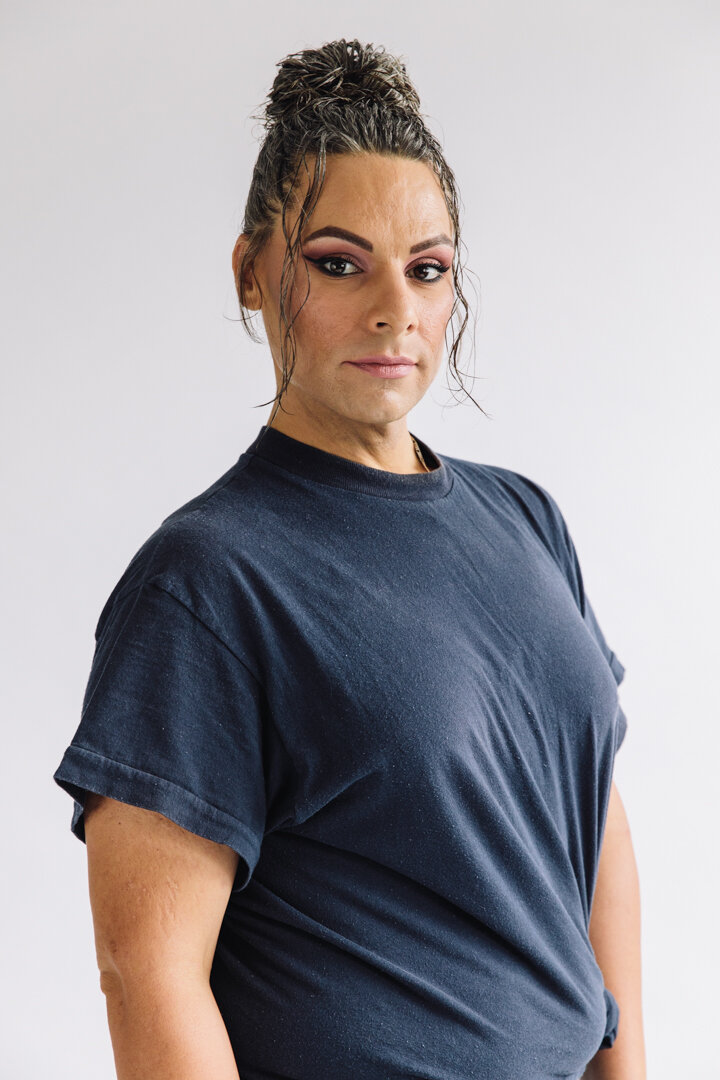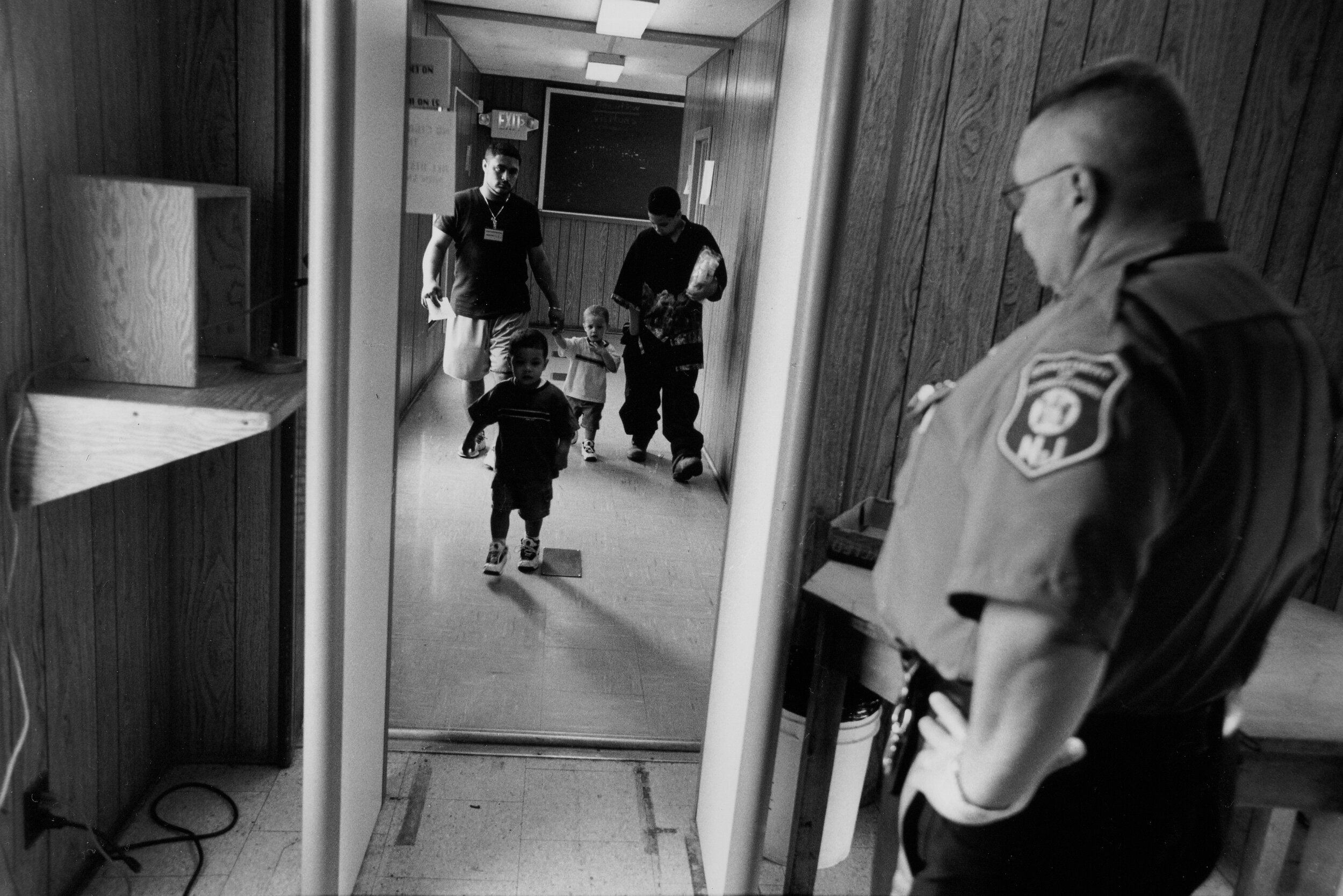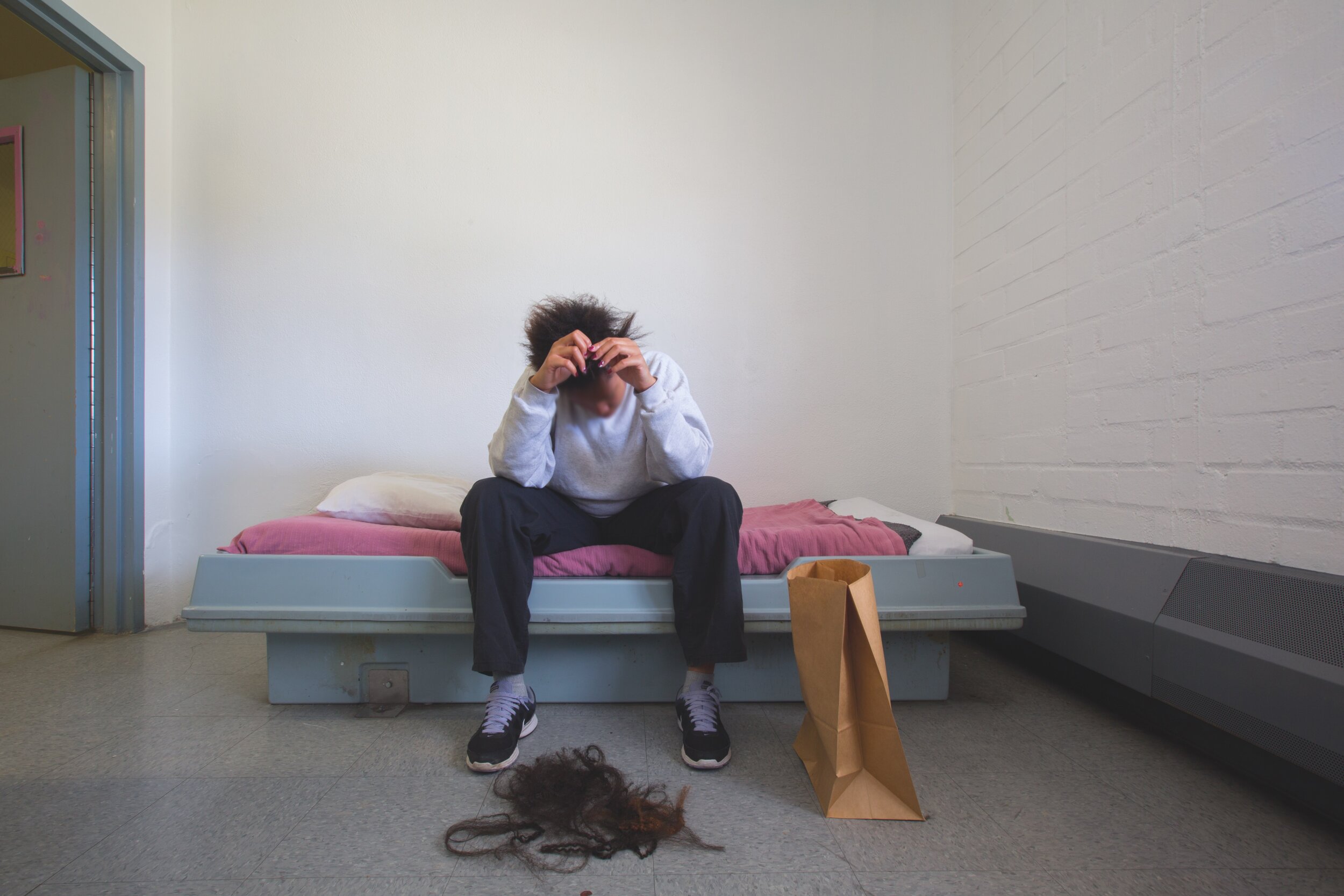MOTHERHOOD IN PRISON
By Dream Hampton
According to The Prison Policy Initiative, there are more than 219,000 women, mostly mothers, in prison in the United States. One in twelve American children (more than 5.7 million kids under the age of 18) have experienced parental incarceration at some point during their lives, based on studies by the 2016 Child and Adolescent Health Measurement Initiative. This separation happens to over 60% of the women in prisons, and over 80% of women in jails across the country.
It has taken years of Black women-led advocacy to prohibit prisons and jails from shackling women during delivery. Organizations like SisterSong, MomsRising, and the Prison Birth Project have had success prohibiting or restricting the use of shackles during labor in most states, but eight states have no laws about a practice that quite literally connects prisons to slavery and endangers the health and lives of vulnerable parents in their most defenseless moments.
It’s not difficult to find parallels between how the Department of Justice treats women and mothers, and the recently well-document tactics used by ICE to separate and traumatize families—especially the young children caught in the middle of it. This puts these children at risk of serious psychological problems, as they are treated as collateral to a so-called nativist, right-wing movement animated by a coming demographic shift.
To those of us whose communities are criminalized, it is clear that the cruel practice of ripping children, even newborns, from their mothers’ arms, is as old as slavery. It is still practiced daily inside prisons and jails and is supported with a straight face and no sense of irony by those who call themselves “pro family” and “pro life.” It happened to my friend Siwatu-Salama Ra.
“We do it every day in every part of the country”
Former Secretary of Homeland Security Kirstjen Nielsen used women like Siwatu to justify this administration’s cruel policy of separating mothers and children at our southern border. “We do it every day in every part of the country,” she told a Congressional committee who demanded answers after the world witnessed the government caging thousands of children. “In the United States,” she said, “we call that law enforcement.
On March 1, 2018, Siwatu, who is a 28-year-old Black woman, environmental justice activist and community leader from Detroit, began a two-year mandatory sentence at the Women’s Huron Valley Correctional Facility in Michigan after being convicted of Felonious Assault and Felony Firearm. She was six months pregnant.
She was rightly terrified about giving birth in prison. A few weeks after arriving at the prison, she had a medical crisis. Siwatu went into labor early when she witnessed a fellow inmate from the pregnant prisoner’s unit return from St. Joseph Mercy maternity ward distraught, inconsolable and separated from her newborn—her still swollen legs in shackles. “I was triggered. This woman I saw every day, who was nine months pregnant, was now no longer pregnant and she was crying. That’s when it became real for me,” she explains.
As a result, Siwatu had an empathy-induced anxiety attack from the realization that the same fate awaited her on her due date in two weeks. That anxiety attack became an asthma attack, then came the contractions.
Women are shackled at their
ankles, arms, and belly
She says guards ignored her for what felt like hours, but when it became clear to the prison staff that she was in distress, a female guard shackled her ankles in what Siwatu describes as “short chains.” It took thirty minutes for another guard to open the prison gate for the transport vehicle that would take her to the hospital. Siwatu lost feeling in her feet. When she got to the hospital, she says, “the doctor wanted to check my cervix but couldn’t because of the chains on my feet.” Another guard changed the chains from short ones to long ones. Despite the fact that she was a pregnant woman in an emergency room at a hospital, the chains remained until, hours later, when she was finally admitted for an infection and given medicine to prevent her from continuing to go into labor. This is routine practice in Michigan and approximately 27 other states where there is no legislation restricting shackling during hospital visits for all imprisoned people, including those who are pregnant. In Michigan women are shackled at their ankles, arms, and belly, up until and directly following what is considered “active labor.”
On May 18th, Siwatu went into labor again and was rushed to St. Joseph Mercy Hospital. This time three armed prison guards and a sergeant were present in the delivery room. Usually there are two female guards present when a pregnant woman gives birth, but Women’s Huron Valley Correctional Facility deemed Siwatu an additional security risk.
Finally unshackled but still surrounded by four guards in the birthing room, Siwatu gave birth to her daughter, with her husband, mother and sister close by. She’d heard from the other women in her unit that the guards are allowed to re-shackle women who’ve given birth immediately after they shower, so she refused one. “I sat in my after-birth for 48 hours without a shower. I sat there, not sleeping, because I didn’t want to hold my baby in chains and I didn’t want to take my eyes off of this baby, this sweet, sweet, baby.”
Before her arrest, Siwatu worked at Detroit-based East Michigan Environmental Action Council (EMEAC). She grew up attending neighborhood meetings and rallies demanding clean air and water, often organized by her mother Rhonda Anderson, a long-time environmentalist. When 19-year-old Renisha McBride was shot through a locked security gate by Ted Wafer at his home in suburban Detroit, Siwatu was one of the first people to join me in the parking lot of the Dearborn Heights police department at an impromptu rally, demanding Wafer’s arrest. In a video I made of the rally, Ra is featured speaking into a hand-held megaphone: “Renisha could’ve been me,” she told the crowd of protesters.
In winter 2018, Siwatu was convicted of assault with a dangerous weapon and felony firearm—she argues she was defending her family after Channell Harvey rammed her car into the driver’s side of Siwatu’s parked car in July 2017. At the time, her two-year-old daughter was playing inside the vehicle, sitting in the driver’s seat and, according to Siwatu, Harvey also weaponized her car to try and run over Siwatu’s mother, Rhonda Anderson. At that point, Siwatu pulled out her licensed, unloaded gun and told Harvey to leave. Shen then left to pick up her husband from work before going to the precinct to file a report. Harvey, the driver of the car had already made a report and the Detroit Police Department deemed Siwatu the aggressor.
Siwatu should not have been put in prison for what was a clear act of self-defense.
During her incarceration, her requests to breastfeed her week-old child during visitation were denied by guards. Humiliated, she asked for a meeting with the deputy warden, Karri Osterhout, and made a formal request that the warden change the breastfeeding policy to allow everyone to breastfeed their babies during visits. The warden denied this request.
“For a moment we felt like real moms”
Afraid the refusal to allow breastfeeding would cause her to spiral into postpartum depression, Siwatu began to organize her supporters and friends to create baby shower wish lists online for the women in her unit. “I got a sheet of paper and asked women to write their names, numbers and addresses and what they’d like for their babies. For a moment we felt like real moms,” she remembers. Her efforts to organize from inside prison led to her unit and supporters advocating for policy changes around several maternal justice issues, including safe and secure settings and protocols related to breastfeeding for “lactating mothers who desire to feed their infants and for pumping and storage of breast milk for these infants.”
Ra and her supporters are continuing to pursue MDOC policy changes, and meeting with Michigan legislators to codify something as basic, healthy and maternal as breastfeeding. When Ra was home on bond, her lawyers continued her appeal process to keep her free. Her son turned six months old days after her release. As she left the prison with a box of letters in her hand, she spoke passionately about her commitment to continue working with and for the women she met inside.
“As an organizer, as someone who’s been an organizer for so many years, I couldn’t not organize. These were women who were organizing on so many things. On a legislation level, they were having letter-writing campaigns; they had their own newsletter. Changing mandatory sentencing, changing the hospice program where they had dying inmates dying alone. So you had women that were working on medical pardons, medical commutations. They are reforming the entire place. Women who were there for 10 years, 20 years, for life, and they said, ‘We deserve better,’ and they did the work,” she said.
While her work for environmental justice is still important to her, Ra says that she’s committed to ending the inhumanity and injustice that has made women the fastest-growing group of people incarcerated in the United States.
“I was inspired by them. Being in spaces like that, I actually forgot that I was in prison,” she says. “I felt like I was at home with my community, and I was. I was with these intelligent women, beautiful women, mothers, grandmothers, aunts, sisters. You had some women in there who were in there with their mothers, organizing together. And I’d never seen anything like it. I want to be like them.”
In January 2020, Ra cut a deal with prosecutors: She pleaded no contest to brandishing a firearm, a 90-day misdemeanor. In exchange, prosecutors dropped the felony firearm and assault charges, an agreement that allowed Ra to go home to her husband and children a free woman as she has already served nine months in prison, as reported by Detroit Free Press.
"I feel like I can breathe again," said Ra, who dropped to her knees outside the courthouse and broke down in tears as her 4-year-old daughter hugged her.
Dream Hampton is an award-winning filmmaker and organizer from Detroit, and was named as one of TIME’s Most Influential People 2019. To learn more about Dream and to support her work visit www.dreamhampton.com.
BIRTHING HOPE
By Siwatu Salama-Ra
No woman plans on being pregnant in prison. But with women being sent to prison at a rapid rate, there are a large number of us who are expecting. Most judges have the discretion to move forward or delay sentencing to allow the mother to give birth in proper conditions that both baby and mother deserve.
For this to happen it would take our judges to show some compassion and decency that our court systems just do not retain. To be imprisoned while pregnant is to be automatically considered “high risk” because the conditions of any prison does not satisfy the needs of baby or mom. All pregnant women who give birth while incarcerated suffer from chronic postpartum depression and a severe sense of hopelessness. This very moment will be the moment she needs healing from. Can you imagine having to put chains on your feet and belly and leave your 24-hour-old baby behind?
You head back to a prison where you won’t find family or those who love you. Breasts full with milk, hormones off balance. Your body yearning for your baby, your brain constantly looking for your newborn. This is and will be the most unnatural painful experience a mother can go through. Waiting weeks, often months to see your baby again once they are approved on your visitors list.
But through it all, we hold onto hope. We hold on to our faith. And we develop a strength we would never imagine we would one day possess. This kite represents hope and love to our children at home.
We love you, and you are the hope we birthed.
UPON GIVING BIRTH
By Dorothy Andre
Upon giving birth on October 2, 2018, I went into labor at medical.
I was strip searched while I was having contractions that were estimated to be a minute apart. I had to stand up and get strip searched while the ambulance arrived. I was then cuffed and left in the ambulance. I went in for my c-section and upon coming out of surgery I had shackles on my feet, even though I wasn't able to walk.
They didn't wait for first shower.
I had to have the nurses change my underwear and pad and the CO didn't even want to remove shackles then, so only one one side was removed. My legs started to swell due to surgery and my doctor at the time, Linda Lewis, asked that shackles be removed, and the sergeant or lieutenant said that they had to put on zip ties or belly chains on me. I didn't understand how they would use belly chains after I had a c-section so they refused to take shackles off. Upon release from the hospital I was shackled and belly chained even after my stomach surgery.
I was offered no Lay In [when food is delivered to you in your cell for medical reasons], so on October 7 I was made to walk to chow with no wheelchair and stand in line.





